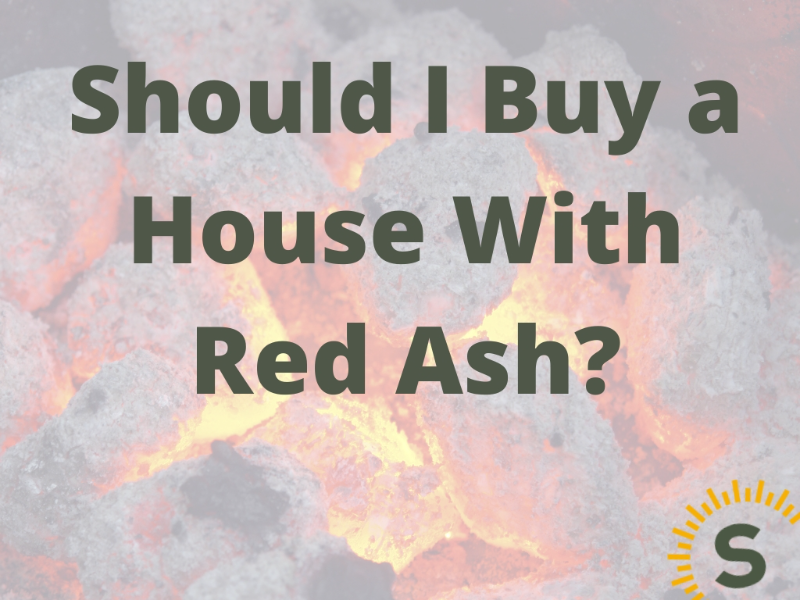
Are you considering buying a house with red ash in the UK? It's a decision that requires careful consideration. Red ash, also known as coal ash or cinder, is a common byproduct of coal combustion and was used extensively in construction in the past. However, it has been linked to potential health and environmental risks.
Before making a decision, it's important to understand the implications of buying a house with red ash. While it may not be a deal-breaker, there are certain factors you need to consider.
This article aims to provide you with all the information you need to make an informed decision, from potential health hazards to legal obligations. So, if you're wondering whether you should buy a house with red ash in the UK, keep reading to understand the topic comprehensively.
Buying a house with red ash, a post-WWII filler material containing sulphate, is risky. It can lead to costly structural damage due to sulphate attack. A HomeBuyer's Report can help detect it, but rectifying issues may cost £10,000 - £20,000, typically not covered by insurance.
Red ash, or coal ash, is a byproduct of burning coal for energy. In the past, it was commonly used in construction due to its low-cost and fire-resistant properties. As a result, many older houses in the UK may contain red ash in their building materials.
However, it's important to note that the use of red ash in construction has significantly declined in recent years due to growing awareness of its potential risks.
Red ash contains various heavy metals, such as arsenic, lead, and mercury, which can pose health risks if released into the environment. When red ash is disturbed or deteriorates, these toxic substances can contaminate the air and water, potentially affecting the health of residents. Therefore, evaluating the potential risks before buying a house with red ash is crucial.
While red ash may be present in some homes, it's important to understand that not all houses with red ash are necessarily hazardous. The risks depend on various factors, such as the condition of the red ash, the extent of its use in construction, and the proximity to sensitive areas like water sources or schools.
A Sulfate attack is a chemical reaction that can harm concrete structures over time. It happens when sulfate molecules from water or the ground react with the concrete. This reaction can make the concrete crack, break, and become weaker. There are two types: one from outside sources, like the ground, and one from materials inside the concrete itself.
At present, lenders do not approve mortgages for properties with Red Ash. However, it is possible to find a lender who can make it a condition of the mortgage to make the relevant repairs before completion.
As mortgages constantly evolve, it's best to consult with an independent mortgage adviser with a whole of market access. They can view the latest up to date policy on red ash set by the lenders.
Buying a house with Red Ash can come with potential risks, such as:
Red ash disturbance can release harmful particles and heavy metals, causing health issues like respiratory problems, heart disease, and cancer when inhaled.
Substances in red ash can leach into the ground, contaminating water sources (wells, reservoirs). This poses serious health risks, especially to children and pregnant women.
Red ash presence may stigmatise the neighbourhood, potentially affecting property values and resale opportunities.
Houses with red ash may take longer to sell and may require price reductions due to buyer hesitancy. Lenders may have stricter requirements, potentially affecting mortgage availability, and insurance may be more costly or challenging to obtain.
In addition to health and environmental concerns, it's crucial to assess the structural integrity of a house with red ash. Over time, red ash can deteriorate and affect the stability of the building. It's recommended to hire a qualified structural engineer to inspect the property and evaluate any potential risks associated with the red ash.
The structural engineer will assess the condition of the red ash, identify any signs of deterioration or damage, and provide recommendations on necessary repairs or remediation. This evaluation is essential to ensure the safety and longevity of the property, as well as to avoid costly repairs in the future.
Before finalising the purchase of a house with red ash, there are several steps you should take to ensure you're making an informed decision:
Understand the history of the area and any known issues related to red ash. Look for information on previous contamination incidents or remediation efforts.
Hire professionals to conduct comprehensive inspections of the property, including structural assessments, air quality tests, and water quality tests. This will help identify any potential risks and provide a clear understanding of the property's condition.
Seek advice from experts familiar with red ash and its potential risks. Environmental consultants, structural engineers, and housing professionals with experience in dealing with red ash can provide valuable insights and guidance.
Carefully review all legal documents, including property disclosures and environmental reports. Pay close attention to any references to red ash or potential contamination issues. If necessary, consult with a solicitor to ensure you fully understand the legal implications.
If you've bought or are considering a house with red ash, it's vital to explore remediation options. These methods involve safely removing, treating, or containing red ash to reduce associated risks. Options include excavation, encapsulation, or stabilisation techniques.
The expense of red ash remediation varies significantly, depending on property size, contamination extent, and chosen method. Costs can range from £5,000 to £10,000. To ensure an accurate estimate, seek quotes from reputable contractors experienced in red ash remediation.
Removing red ash from a floor is a complex and potentially hazardous task. To ensure safety, hire a professional experienced in hazardous material removal. They'll use proper personal protective equipment (PPE) such as goggles, gloves, and masks. Just like with Asbestos, proper disposal following local regulations for hazardous materials is crucial.
Buying a house with red ash in the UK requires careful consideration of the potential risks, legal obligations, and remediation options. While it may not be a deal-breaker for some, it's crucial to thoroughly assess the condition of the property, consult with experts, and weigh the potential health and environmental implications.
While red ash may present challenges, it's important to note that with proper precautions and remediation measures, houses with red ash can be made safe and habitable.

Stuart is an expert in Property, Money, Banking & Finance, having worked in retail and investment banking for 10+ years before founding Sunny Avenue. Stuart has spent his career studying finance. He holds qualifications in financial studies, mortgage advice & practice, banking operations, dealing & financial markets, derivatives, securities & investments.
 No minimum
No minimum  Newcastle-under-Lyme, Staffordshire
Newcastle-under-Lyme, Staffordshire Free Consultations
Free Consultations
 No minimum
No minimum  Free Consultations
Free Consultations
 No minimum
No minimum  No obligation consultation
No obligation consultation
 No minimum
No minimum  No obligation consultation
No obligation consultation
 No minimum
No minimum  Free Consultations
Free Consultations
 No minimum
No minimum  No obligation consultation
No obligation consultation
 No minimum
No minimum  No obligation consultation
No obligation consultation
 No minimum
No minimum  Free Consultations
Free Consultations
 No minimum
No minimum  Coatbridge, Lanarkshire
Coatbridge, Lanarkshire Initial or Ongoing Consultation Fees
Initial or Ongoing Consultation Fees
 No minimum
No minimum  Initial or Ongoing Consultation Fees
Initial or Ongoing Consultation Fees
 £21,000 +
£21,000 +  Initial fee free consultation
Initial fee free consultation
 London, Greater London
London, Greater London No obligation consultation
No obligation consultation
 No minimum
No minimum  No obligation consultation
No obligation consultation
 No minimum
No minimum  Initial fee free consultation
Initial fee free consultation
 No minimum
No minimum  No obligation consultation
No obligation consultation
 No minimum
No minimum  No obligation consultation
No obligation consultation
 No minimum
No minimum  Initial fee free consultation
Initial fee free consultation
 No minimum
No minimum  Initial or Ongoing Consultation Fees
Initial or Ongoing Consultation Fees
 £51,000+
£51,000+  Free Consultations
Free Consultations
 No minimum
No minimum  No obligation consultation
No obligation consultation
 No minimum
No minimum  Initial fee free consultation
Initial fee free consultation
 £101,000+
£101,000+  Bishop's Stortford, Hertfordshire
Bishop's Stortford, Hertfordshire No obligation consultation
No obligation consultation
 No minimum
No minimum  Derry / Londonderry, County Derry / Londonderry
Derry / Londonderry, County Derry / Londonderry Free Consultations
Free Consultations
 No minimum
No minimum  Stockton-on-Tees, County Durham
Stockton-on-Tees, County Durham Free Consultations
Free Consultations
 No minimum
No minimum  Initial fee free consultation
Initial fee free consultation





Our website offers information about financial products such as investing, savings, equity release, mortgages, and insurance. None of the information on Sunny Avenue constitutes personal advice. Sunny Avenue does not offer any of these services directly and we only act as a directory service to connect you to the experts. If you require further information to proceed you will need to request advice, for example from the financial advisers listed. If you decide to invest, read the important investment notes provided first, decide how to proceed on your own basis, and remember that investments can go up and down in value, so you could get back less than you put in.
Think carefully before securing debts against your home. A mortgage is a loan secured on your home, which you could lose if you do not keep up your mortgage payments. Check that any mortgage will meet your needs if you want to move or sell your home or you want your family to inherit it. If you are in any doubt, seek independent advice.